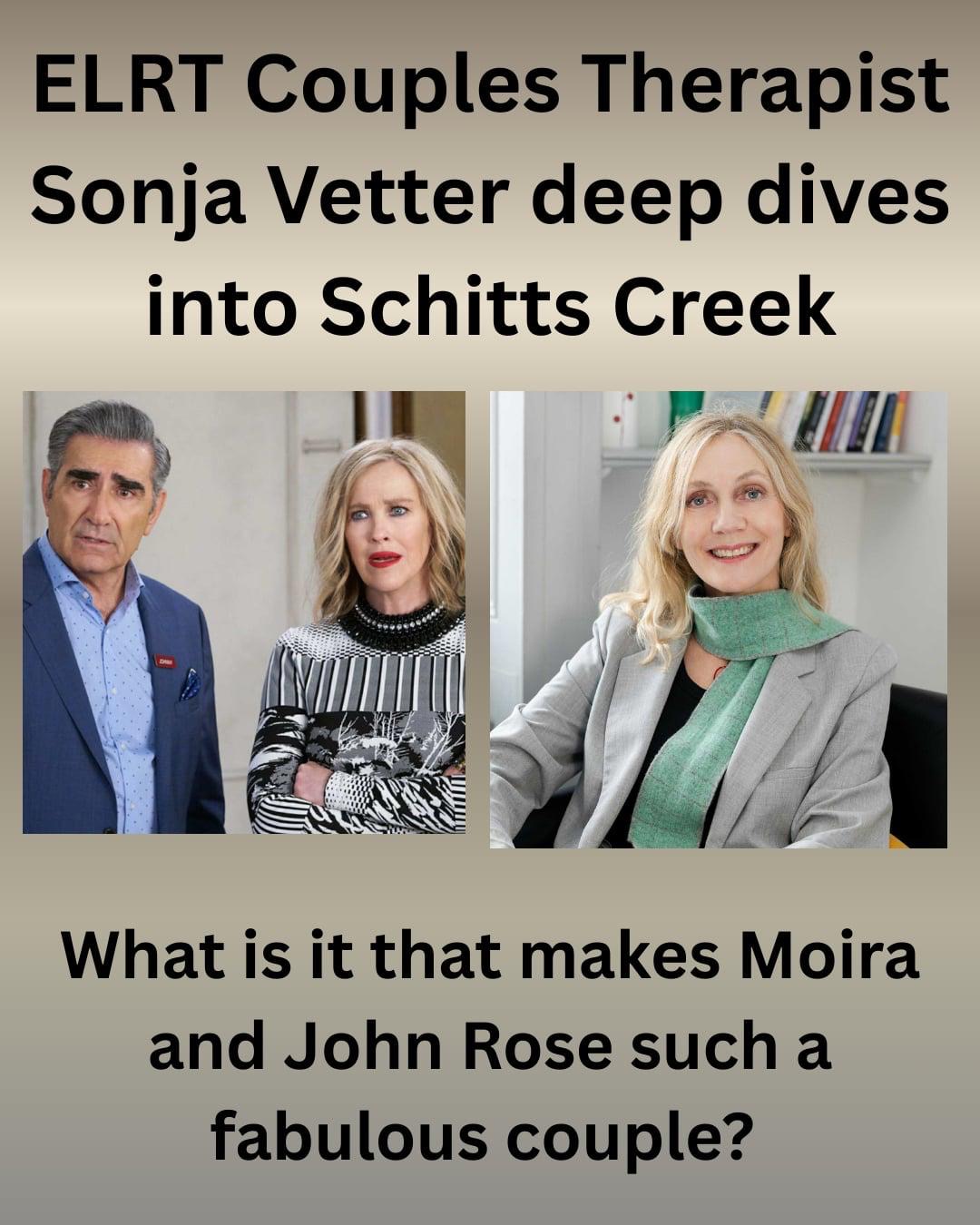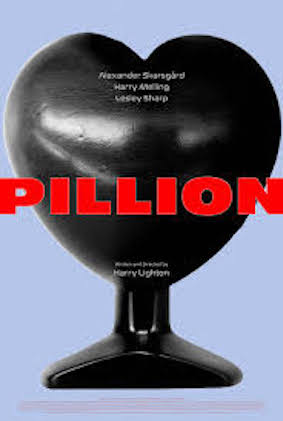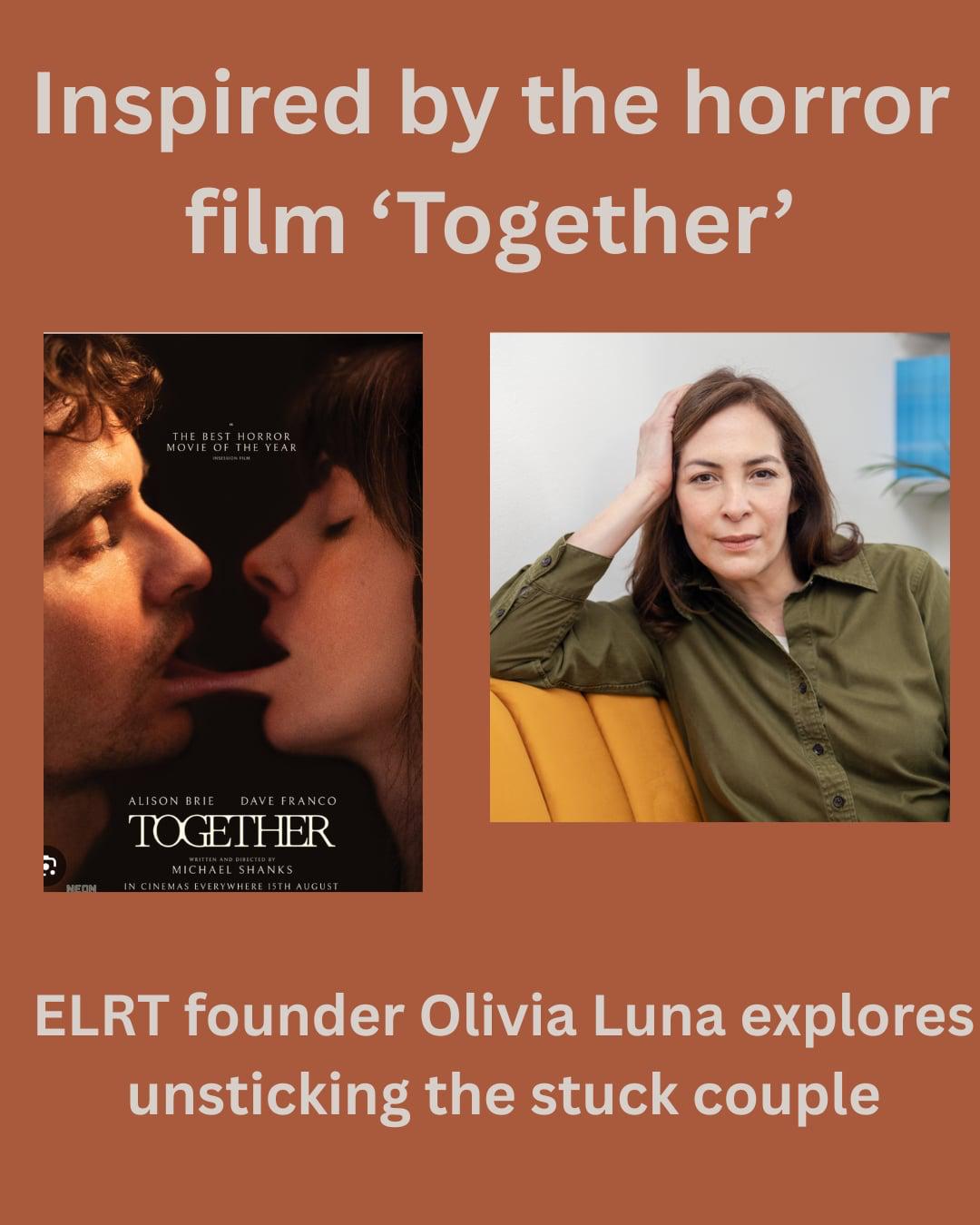
For Valentines Day, I thought I’d write about a film I saw a little while ago called ‘Materialists’ starring Dakota Johnson, Pedro Pascal and Chris Evans.
The overall plot centres around the transactional dating market where people relate to each other in what psychoanalysts call: ‘part objects’ - focusing on the function of a person rather than taking in the whole autonomous person.
Some examples of these ‘parts’ are Height, Salary, Age.

Since the quality of our relationships are so important to our emotional wellbeing and mental health, I wanted to take a closer look at one particular onscreen couple from the series Schitt’s Creek. There is no one-size-fits-all, so my observations relate to this specific couple and their interaction.
The series Schitt’s Creek is comedic genius and sweet eccentricities aside, the depiction of the relationship between Moira and Johnny Rose is really the beating heart of the series. Moira, the grandiose, eccentric matriarch and Johnny, the more down-to-earth doer, despite occasional distractions, are a rare onscreen marvel in couple strength. Whilst their relationship isn’t perfect and enjoys plenty of turbulence, the couple doesn’t redirect conflict into and within their alliance but resolves it by sticking together. This strength allows them to beat adversity, and they’ve had plenty of it.

I’ve always been intrigued by BDSM. I remember going to Bagleys Studios in the late 90’s for a night called Club Submission, run by the legendary DJ Rubber Ron. Call it voyeurism or natural curiosity, I was fascinated by the various sub/dom dynamics witnessed in this clubbing subculture.
So it’s refreshing to see a mainstream film with well known actors embracing their inner sub/doms to play the unlikely pairing of ‘Colin and Ray’.
As a psychosexual therapist, I found Pilllion worth writing about not for the sex but for its broader portrayal of BDSM. This film is NOT about kinky bedroom activities or dungeons (a common trope), it’s actually about self exploration and an important rights of passage: surviving the first heartbreak.

I’m on my way to Paris for the weekend, the city of romance, and so it seems appropriate to write about one of the most common dilemmas that couples bring to therapy - Affairs.
In five anonymous real life stories, Juliet Rosenfeld’s book illustrates how there is more than meets the eye when it comes to these very personal transgressions. At the end of each account, Rosenfeld offers a ‘formulation’ explaining the powerful gravitational ‘pull of the past’ that draws the people she’s written about to risk everything for the sake of an affair.

Last summer I noticed the posters on London buses for a film called ‘Together’. The tag line said ‘Best horror movie of the year’. I love an outlandish supernatural horror and this one is filled with couple dynamics. My ‘couple therapist antenna’ was instantly sparked so I headed to the cinema.

Perinatal loss or having an unwell child can put a strain on even the strongest of relationships. There is often a struggle to find a culprit and blame often gets misdirected. Toxic Town, a Netflix drama written by Adolescence-writer Jack Thorne, shows us a group of families who are struggling with just this, but who are able to identify and 'win' against the genuine culprit - a victory and catharsis that is typically unavailable to most parents who have experienced perinatal loss or have children with illnesses or disabilities.
Read more: TV Review: 'Toxic Town' from a Psychotherapist perspective

As a sex and relationship therapist, I found this book a must read for anyone working with themes around love, acceptance and desire. This isn’t an academic book for therapists, or yet another self help book written by a therapist. ‘Love in Exile’ consists of eight chapters of real life reflections by Shon Faye, a trans woman who candidly and generously shares her experiences and struggles with love and self acceptance.

Through millennia there have been several iterations of ‘Damsel in Distress meets Prince Charming’. From fairytales, Disney movies and of course Pretty Woman, which I think is the closest comparison to Anora. However, I found Anora refreshingly real when compared to its counterparts.
Here we have a feisty exotic dancer/sex worker who finds her ‘Prince Charming’ in the form of a Russian oligarch’s son. However, this is no fairytale with a happy ending, in fact, the ending of this film culminates in an avalanche of emotions!
Read more: ELRT founder Olivia Luna explores attachment styles in Anora

After being told by several people that I should watch Babygirl, I finally did and concluded that a mainstream film like this was long overdue!
Historically female sexual desire has been suppressed, or a mystery at best! Dating back to the early 20th century, when women were ‘treated' with a pelvic massage so they can release what we now know as an orgasm, to the 1950’s Stepford wives, where female sexual desire exists only in relation to men's need for sex, and where sex was seen as a duty to their husbands. We’ve come a long way and today there are various books such as Emily Nagoski’s ‘Come as You Are’ and more recently Gillian Anderson’s ‘Want’, a collection of female sexual fantasies. A film like Babygirl, illustrates that there is still work to be done around understanding and accepting the full spectrum of female desire.
Read more: Film Review: Babygirl from a Couple Therapist perspective

I live in Hackney, the most diverse borough in the UK. One of my neighbouring cultural pockets is of the Hasidic Jewish community in Stamford Hill. I don’t think I’m alone in confessing to a fascination with closed religious communities. So when I heard there was a Netflix series based on a similar community in New York, I was intrigued.
This series is based on the memoirs of Deborah Feldman’s book ‘Unorthodox: The Scandalous Rejection of My Hasidic Roots ‘. What specifically drew me to this series is its depiction of sex and the role sexual relations play within the marriage parameters of the traditional community Deborah was brought up in.
Read more: Unorthodox and Vaginismus, a psychosexual perspective
People often assume that my relationship must be perfect because I’m a couples therapist. Let’s be honest, no matter how many letters you have after your name, nobody’s relationship is perfect. This couldn’t be more true during one of the most unprecedented times of this generation. The Coronavirus outbreak put its mark on many people's lives, some more tragic than others but overall it could be described as a global trauma. Lockdown also put considerable strain on couple relationships all over the world, and mine was no exception.
Read more: What I learned about my relationship during lockdown

Well, that was different. One early March evening I’m meeting a new date in a bar for a drink, the night going well and the conversation flowing freely. Dates two and three follow hot on its heels and another is hastily scheduled. So far, so good. And then the world changed.
Somewhere in the scramble to adapt to the ‘new normal’, as I bid a temporary farewell to staples such as shop-bought pasta and regular employment, I’m also left contemplating the new reality of dating Lockdown style. And what a Brave New World it proves.
Back in the dark ages, when we witnessed the birth of internet dating, it marked the start of a brave new world in which to meet a new partner. Prior to its invention, lonely hearts columns were confined to the back pages of various publications and were viewed either as a source of amusement or a resource for the desperate.
Read more: Online Dating during Covid-19, escapism or reality?

Couple fit: Marianne and Connell
When I first meet a couple for an initial consultation, one of the thoughts I hold in mind are ‘why did this couple choose each other’
As a couple therapist, understanding the ‘couple fit’ is an important part of the work. This is to do with the unconscious reasons couples gravitate towards each other and it explains that feeling of connection that is often felt when potential lovers ‘click’.
Recently, two of my clients told me I should watch the BBC series Normal People, so how could I resist, especially as it’s about a couple and the trajectory of their relationship.
Sometimes relationships may undergo periods of stress and it may feel as if they are a source of unhappiness or confusion. Relationship counselling helps couples and individuals explore problematic patterns that may be affecting their quality of life. The problem may be recurring or after an event or series of events.
We work with a wide range of couples from different cultural backgrounds and sexual orientations
Psychosexual therapy is an integrative approach which combines talking therapy with behavioural therapy. It can take place on an individual basis or with a partner. It will involve an assessment of the sexual issue (including any associated medical factors) whilst exploring further how the relationship, sexual development and personal history may be affecting the sexual issue. Behavioural exercises may be discussed in the sessions, which will then be carried out at home to help the individual or couple address their sexual difficulties.
Individual counselling is a joint process between a therapist and client. Common goals of therapy may be to motivate change or improve quality of life. Therapy can help people overcome obstacles to emotional and mental well-being.
It can also increase positive feelings, such as compassion and self-esteem. People in therapy can learn healthy skills for managing difficult situations, making positive decisions, and reaching goals.